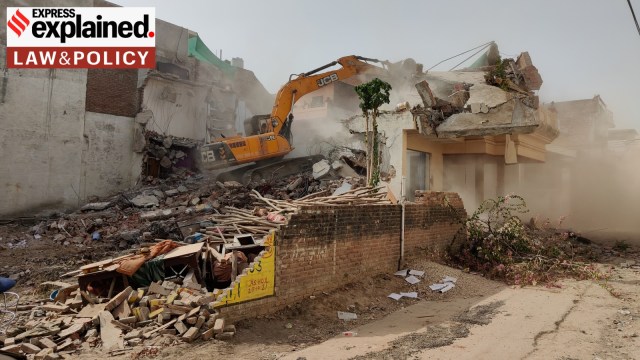‘Bulldozer justice’: What do local laws in states say about demolitions?
SC has said it will lay down ‘pan-India guidelines’ on demolitions. State laws do allow demolitions under specific conditions, and after following due process. A look at some examples.
 A Supreme Court Bench of Justices B R Gavai and K V Viswanathan orally observed, “Even if he is a convict, still it can’t be done without following the procedure as prescribed by law.” (Representational image/Express)
A Supreme Court Bench of Justices B R Gavai and K V Viswanathan orally observed, “Even if he is a convict, still it can’t be done without following the procedure as prescribed by law.” (Representational image/Express)The Supreme Court on Monday (September 2) expressed displeasure over the random demolition of homes and properties of persons accused of crime without following due process, and said it would lay down pan-India guidelines on this issue.
A Supreme Court Bench of Justices B R Gavai and K V Viswanathan orally observed, “Even if he is a convict, still it can’t be done without following the procedure as prescribed by law.”
The court was hearing applications challenging house demolitions carried out by the state government in Rajasthan and Madhya Pradesh. In both cases, demolitions took place after Muslim tenants allegedly committed crimes that triggered communal tensions.
The applications were tagged with a petition filed by the Jamiat-Ulama-i-Hind challenging demolitions carried out in Jahangirpuri in Delhi in 2022. Since then, demolition drives carried out in other states have been challenged as well. This is what local laws in these states say about demolitions.
RAJASTHAN
On August 17, the Udaipur Municipal Corporation demolished a tenant’s house that had allegedly “encroached” on forest land.
The demolition took place after the tenant’s 16-year-old son was arrested for allegedly stabbing his classmate who belonged to another community, which led to communal tensions in the city.
Notices were issued by the Udaipur Municipal Corporation and the Regional Forest Officer, Udaipur West, on the previous night, stating that the house had illegally encroached on forest land.
Section 245 of the Rajasthan Municipalities Act, 2009 (“Encroachment or obstruction upon public land”), says anyone who encroaches upon public land can be punished with up to three years in prison and a fine of up to Rs 50,000.
The civic body can also seize and confiscate such property. However, under Section 245(10), the alleged offender must be first served notice in writing with the grounds on which the property is being confiscated. Also, the offender must be given an opportunity to make a written representation “within such reasonable time” that is specified in the notice, as well as an opportunity to be heard.
Also, under Section 91 of the Rajasthan Forest Act, 1953, only a Tehsildar can pass an order to evict a “trespasser” and order that the land in question be seized if it is being illegally occupied.
MADHYA PRADESH
In June, the ancestral home of a labourer was demolished by the administration of the district after his son was accused of placing the severed head of a “bovine” in the premises of a local temple.
Police registered an FIR against the applicant’s son on June 14, and demolished part of his house on the same day, allegedly without serving notice.
Under Section 187 of the Madhya Pradesh Municipalities Act, 1961, the Municipal Council can “remove, alter, or pull down” a building if it has been constructed or altered without permission from the council.
However, the Act states that notice must be served to the owner first to show sufficient cause as to why the building should not be removed or pulled down. The building can be demolished only if the owner “fails to show sufficient cause” in response to the notice.
UTTAR PRADESH
In June 2022, the Jamiat-Ulama-i-Hind had approached the Supreme Court to challenge demolitions that were carried out in Uttar Pradesh in the aftermath of the violent protests that had followed certain remarks made by then BJP leader Nupur Sharma about the Prophet during a television debate.
Demolitions in Uttar Pradesh are governed under the Uttar Pradesh Urban Planning and Development Act, 1973. Section 27 of the Act (“Order of demolition of building”) deals with cases where land has been developed without permission from the Vice-Chairman of the UP Development Authority (established by the state government).
In such instances, an order of removal will be sent to the owner and the development shall be removed by demolition “within such period not being less than fifteen days and more than forty days” from the date the order is issued.
The owner can appeal against the order to the chairman of the development authority, who can either allow or dismiss the appeal. According to Section 27(4), this decision “shall be final and shall not be questioned in any Court”.
DELHI
The proceedings at the Supreme Court began following communal violence in Delhi’s Jahangirpuri in April 2022. A procession for Hanuman Jayanti that took place on April 16 sparked communal tensions in the area, leading to stone pelting and violence.
On April 20, the North Delhi Municipal Corporation (NDMC) launched a demolition drive to remove “illegal encroachments” in the area. On the same day, the Jamiat-Ulama-i-Hind filed a plea seeking a stay on the demolition drive, which was granted by the Supreme Court.
During the hearings, Solicitor General Tushar Mehta referred to the Delhi Municipal Corporation Act, 1957 (DMC Act). Under Sections 321 and 322 of the Act, the commissioner of the municipal corporation can remove without notice, if placed without permission, “any stall, chair, bench, box, ladder, bale or other thing whatsoever”, or “any article whatsoever hawked or exposed for sale on any public street or…any vehicle, package, box, or any other thing in or on which such article is placed”.
Under Section 343, the commissioner can order demolition if a building has been erected without permission, or work has commenced which violates provisions of the DMC Act. The commissioner can direct that the “work” in question be demolished within 5-15 days.
However, the commissioner must give the individual “reasonable opportunity” to show why a demolition order should not be issued. A demolition order can also be appealed before the Appellate Tribunal established under the DMC Act.
HARYANA
Days after communal violence flared up in the Muslim-majority Nuh district of Haryana during the Brajmandal Jalabhishek Yatra in August 2023, state authorities demolished 443 structures. In an affidavit submitted to the Punjab & Haryana High Court, the district administration said 354 people were affected by the demolitions, 283 of whom were Muslims, and the rest were Hindus.
Demolitions in the state are governed by Section 261 of the Haryana Municipal Corporation Act, 1994. The provision shares many similarities with Section 343 of the DMC Act. But the individual has less time to begin demolishing the building or “work” — it is only three days (compared to five under the DMC Act) — and it is not specified when the window will shut (compared to the maximum 15 days available in Delhi).
Like in the DMC Act, however, the owner of the building/ “work” must be provided with “reasonable opportunity” to argue why a demolition order should not be issued, and they may appeal a demolition order before a district judge in that jurisdiction.
Photos




- 01
- 02
- 03
- 04
- 05

































